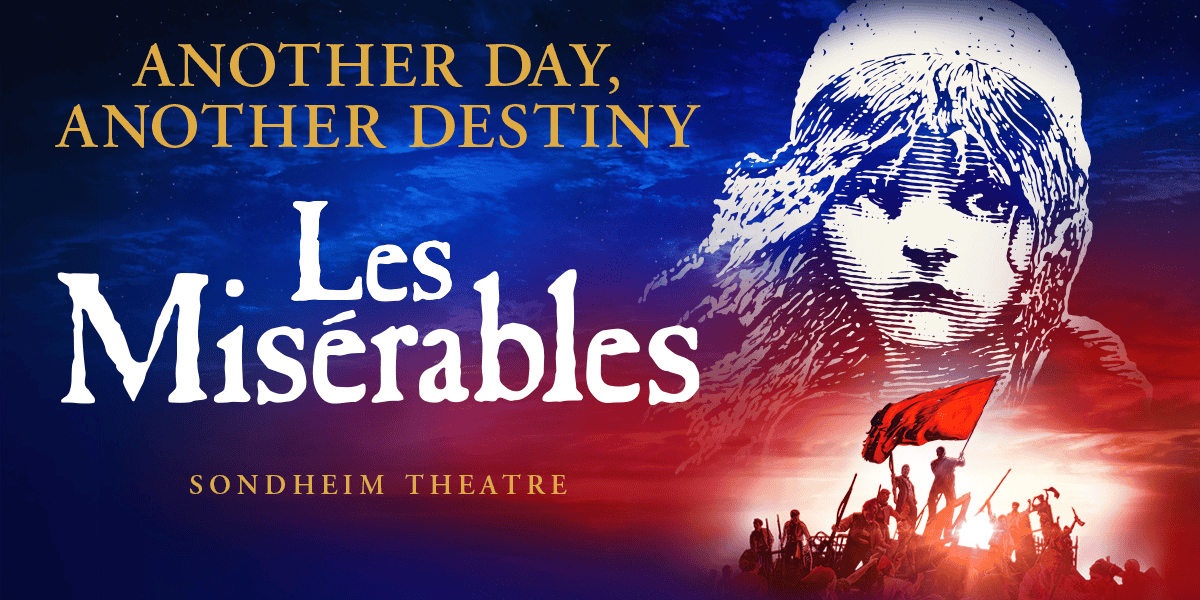A Comprehensive Guide to Les Misérables Songs
Published on 5 June 2024
Last updated on 16 September 2025
- Iconic songs include *I Dreamed a Dream*, *On My Own*, *One Day More*, and *Do You Hear the People Sing?*.
- Each carries emotional and narrative weight, from despair to revolution.
- Music by Claude-Michel Schönberg and Alain Boublil remains legendary.
Les Misérables, the timeless West End musical based on Victor Hugo's classic novel, has enraptured audiences worldwide with its poignant story, memorable characters, and unforgettable music. Composed by Claude-Michel Schönberg, with lyrics by Alain Boublil and Jean-Marc Natel, the musical's songs evoke a range of emotions, from heartbreak to hope, as they follow the journey of redemption and revolution. Delve into the magic of Les Misérables' songs with this definitive guide and experience the power of the barricades at the Sondheim Theatre in London - one of the West End’s longest running musicals.
The Most Notable Les Misérables Songs
Les Misérables' songs, performed by a talented cast, have left an indelible mark on musical theatre, with each piece contributing to the narrative's depth and emotional resonance. Experience the grandeur of these songs firsthand as they unfold on stage.
Prologue: Work Song
Amidst fellow convicts, Jean Valjean, known as prisoner 24601, faces the consequences of stealing bread to save his family. Though he yearns for freedom, Javert, the prison guard, and society brand him a lifelong convict. This powerful opening sets the stage for the show's major themes and the looming clash between Valjean and Javert.
Prologue: Valjean Arrested/Valjean Forgiven
In the throes of despair, Jean Valjean faces immediate arrest for stealing silver from the Bishop’s abode. Yet, amidst his darkest hour, an unexpected act of compassion unfolds. The Bishop, rather than condemn him, forgives Valjean and proclaims the silver a gift.
Prologue: What Have I Done?
Valjean confronts his inner demons in 'Prologue: What Have I Done?' The Bishop's profound declaration, "I have bought your soul for God," resonates deeply within him. With poignant self-reflection, Valjean condemns his past actions, likening himself to a "thief in the night... a dog on the run." Determined to forge a new path, he embraces a fresh identity, a renewed narrative, and a transcendent purpose.
At the End of the Day
'At the End of the Day' is a powerful ensemble number that sets the tone for the hardships faced by the poor and downtrodden in 19th-century France. The song's stirring melodies and impassioned lyrics introduce the audience to the harsh realities of life for characters like Fantine, establishing the backdrop for the unfolding drama.
I Dreamed a Dream
Known as one of the most famous Les Misérables' songs, 'I Dreamed a Dream' is a haunting solo performed by Fantine, reflecting on her shattered dreams and lost innocence. The song's emotive lyrics and melody capture Fantine's despair and longing for a better life, making it one of the musical's most memorable moments.
In My Life
'In My Life' is a heartfelt duet between Cosette and Valjean, as they reflect on their shared past and the bond that unites them. The song's introspective lyrics capture the characters' love and gratitude, offering a moment of quiet intimacy.
Castle on a Cloud
'Castle on a Cloud' is a tender solo performed by young Cosette, as she dreams of a better life away from the cruelty of the Thénardiers. The song's gentle melody and innocent lyrics capture Cosette's longing for love and security.
A Heart Full of Love
'A Heart Full of Love' is a tender trio sung by Marius, Cosette, and Eponine, expressing their feelings of love and longing amidst the tumult of revolution. The song's beautiful harmonies and romantic melodies capture the complexities of their relationships, offering a moment of respite amidst the chaos of war.
One Day More
'One Day More' is a powerful ensemble number that serves as the climax of Act I, bringing together the major characters as they confront their destinies on the eve of the June Rebellion. The song's stirring melodies and overlapping harmonies build tension and anticipation, setting the stage for the revolution to come. It’s hard to think of a more iconic Les Misérables song!
On My Own
'On My Own' is a poignant solo sung by Eponine, expressing her unrequited love for Marius and her loneliness as she navigates the harsh realities of life on the streets of Paris. The song's emotive melody and heartfelt lyrics capture Eponine's resilience and vulnerability, offering a glimpse into her inner world as she longs for a love that can never be.
At the Barricade (Upon These Stones)
'At the Barricade (Upon These Stones)' is a stirring ensemble number performed by the revolutionaries as they prepare to defend their makeshift barricade against the forces of the French army. The song's defiant chorus and anthemic melody capture the characters' courage and determination in the face of oppression, setting the stage for the climactic battle to come.

Little People
'Little People' is a darkly humorous solo sung by Gavroche, the plucky street urchin who joins the revolutionaries on the barricades. The song's spirited melody and witty lyrics showcase Gavroche's bravery and resourcefulness, providing a moment of levity amidst the tragedy of war.
Empty Chairs at Empty Tables
'Empty Chairs at Empty Tables' is a poignant solo sung by Marius, reflecting on the loss of his friends and comrades in the aftermath of the failed revolution. The song's haunting melody and introspective lyrics capture Marius' survivor's guilt and grief, offering a moment of quiet reflection amidst the chaos of war.
Beggars at the Feast
'Beggars at the Feast' is a raucous duet performed by the Thénardiers as they revel in their ill-gotten gains following the revolution. The song's lively melody and irreverent lyrics capture the Thénardiers' greed and amorality, offering a comedic contrast to the musical's darker themes.
Valjean's Death
'Valjean's Death' is a poignant solo sung by Jean Valjean as he nears the end of his life. The song's introspective melody and heartfelt lyrics reflect Valjean's journey of redemption and his ultimate acceptance of mortality. As he passes into the afterlife, Valjean finds peace and redemption, leaving behind a legacy of compassion and forgiveness.
Do You Hear the People Sing?
'Do You Hear the People Sing?' is the rallying cry of the revolutionaries, expressing their defiance and determination in the face of oppression. The song's anthemic chorus and triumphant melody inspire hope and solidarity, echoing throughout the streets of Paris as the people rise up against injustice.
Red and Black
'Red and Black' is an ensemble number performed by the students of the ABC Society, as they prepare for the impending revolution. The song's stirring chorus and defiant lyrics capture the idealism and passion of the young revolutionaries, setting the stage for their ultimately tragic struggle.
Stars
'Stars' is a powerful solo sung by Javert, expressing his unwavering commitment to upholding the law and pursuing Jean Valjean. The song's soaring melody and dramatic orchestration convey Javert's moral certainty and obsession, highlighting the internal conflict that drives his character.
Drink with Me
'Drink with Me' is a sombre ballad sung by the students of the ABC Society as they await the dawn of the revolution. The song's haunting melody and melancholy lyrics convey the characters' sense of camaraderie and impending doom, offering a moment of reflection amidst the chaos of battle.
Bring Him Home
'Bring Him Home' is a heartfelt plea sung by Jean Valjean, praying for Marius' safety and happiness as he prepares to join the revolution. The song's tender melody and lyrics capture Valjean's selflessness and compassion, offering a moment of solace amidst the chaos of war.
Master of the House
'Master of the House' is a lively and irreverent duet sung by the innkeeper Thénardier and his wife, Madame Thénardier, as they swindle their unsuspecting guests. The song's bawdy humour and catchy melody provide a comedic contrast to the musical's darker themes, showcasing the Thénardiers' opportunism and amorality.
A Little Fall of Rain
'A Little Fall of Rain' is a tender duet between Eponine and Marius, as Eponine succumbs to her injuries in Marius' arms. The song's gentle melody and poignant lyrics capture the characters' love and loss, offering a moment of bittersweet intimacy amidst the chaos of the barricades.
Finale: Do You Hear the People Sing? (Reprise)
'The Finale: Do You Hear the People Sing? (Reprise)' brings Les Misérables to a powerful conclusion, with the cast uniting once more to proclaim their faith in the future and their commitment to the ideals of liberty, equality, and fraternity. The song's triumphant reprise of the musical's anthem leaves the audience uplifted and inspired, reminding us of the enduring power of hope and the resilience of the human spirit.
Which Les Misérables Song Stands Out the Most?
Among the remarkable songs in Les Misérables, 'I Dreamed a Dream' stands out as one of the most poignant and unforgettable. Fantine's heartbreaking lament captures the essence of the musical's themes of love, loss, and redemption, leaving a lasting impression on audiences with its haunting melody and emotive lyrics.

By Hay Brunsdon
I've 15 years of writing and editorial experience, and starting working in the West End theatre industry in 2012. When not watching or writing about theatre I'm usually swimming, hiking, running, or training for triathlons in the Stroud valleys.

